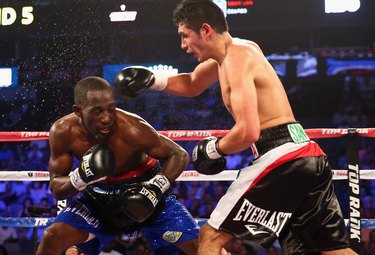
For every high-level professional boxer, there are thousands of amateurs putting time in at their local gyms preparing for a first fight. There's no blanket answer as to how much training anyone needs before that first bell. To make that decision, you need to objectively assess your skills, training patterns and mental state.
Difficulty
Video of the Day
Some amateurs will be ready after training for a little over a month, but you can hurt yourself, literally, trying to keep up with someone else's schedule. The United States Olympic Committee ranked boxing as the most difficult of 60 sports due to its high demands of endurance, speed and durability. In other words, you should be in the best shape possible before you take that first fight. You need skills to succeed in amateur boxing, but the match is usually won by the boxer in better shape.
Video of the Day
Training Routine
Your training must be set up to maximize physical conditioning and skill development. Focus on strength and conditioning two or three times per week and put in some time doing bag work and one-on-one sessions with your trainer. You should be able to spar for six rounds while preparing for a three-round amateur boxing debut. Once you have the movements down, physical conditioning will only take a few weeks up to two months preparing for a bout.
Team Effort
Instead of surrounding yourself with "yes men," you want coaches who will be honest with you about your progress. A coach will expect you to run three-to-five miles without getting tired, jump rope for at least 30 minutes, hit the heavy bag for 15 minutes straight and be able to spar with lots of different training partners. To get to this point, it's all about repetition. As long as you're training four or five times per week and putting in extra conditioning rounds on the side, you'll be in fight shape within two months.
Making the Transition
You can't simulate the intensity of a full-contact boxing match in the gym without compromising your training camp. You can, however, set a series of benchmarks to achieve before making the transition to the ring. The most important are endurance, defense, speed, power and autonomy, respectively. All of these skills are best learned through repetition.